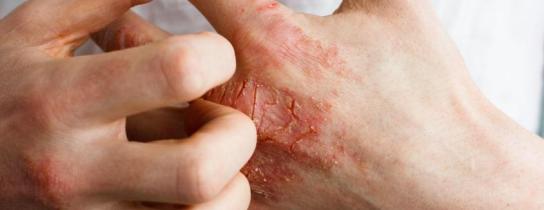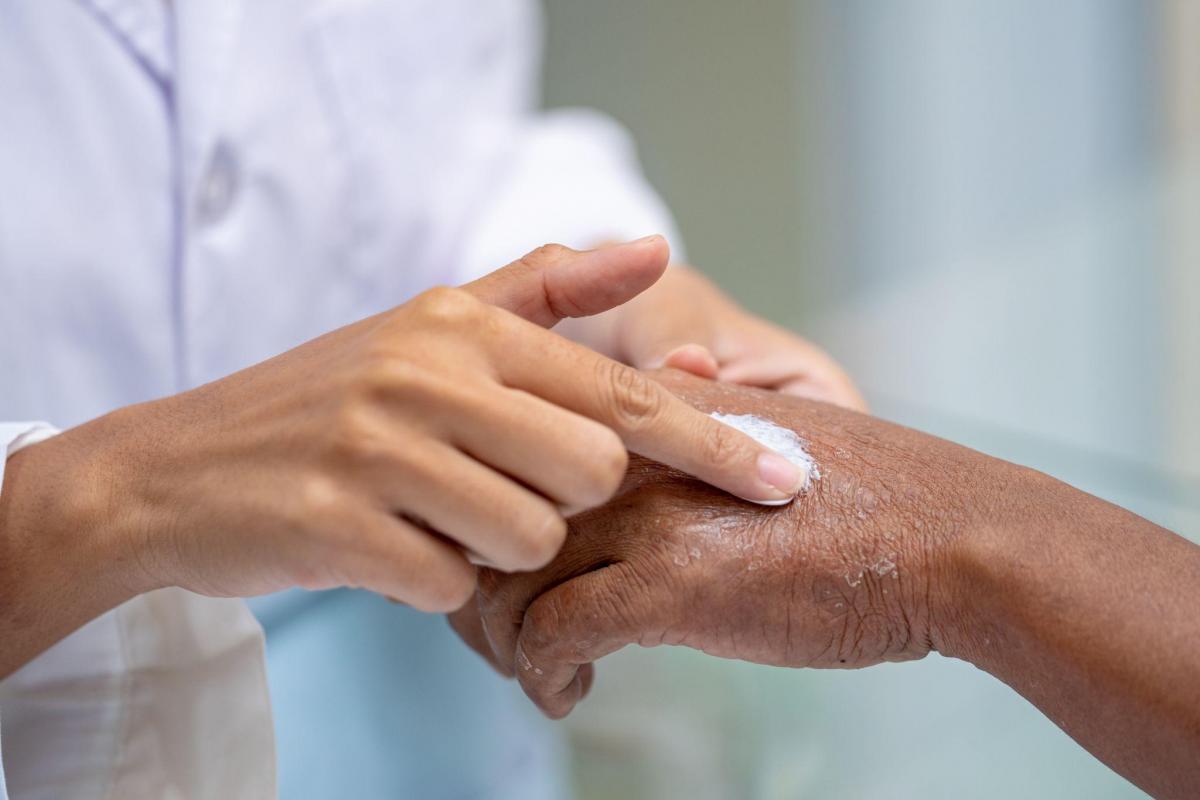
Eczema Explained: From Flare-Ups to Effective Management
According to the National Eczema Association, 31.6 million people in the United States have eczema or another inflammatory skin condition.1 Our eczema information guide can help people looking for more information about their skin condition.
Understanding Eczema: The Science behind the Itch
Skin is a barrier that protects you from harmful bacteria. Your skin contains good bacteria and antibacterial peptides (AMPs) that fight germs and other harmful things.
An imbalance in these bacteria can lead to a weak skin barrier and the development of eczema, or itchy, irritated skin. People with eczema have been found to produce fewer AMPs, which means their skin has a harder time fighting infection or irritation. Genetics can also play a significant role in the development of skin conditions.
Types of Eczema: Atopic Dermatitis, Contact Dermatitis, and Beyond
The terms “eczema” and “dermatitis” both describe irritated, inflamed skin and are often used interchangeably. However, they are not the same.
Dermatitis refers to skin inflammation that is often temporary, which can include anything from acne to rashes. Eczema describes skin conditions that last longer and occur on a more chronic basis, and its symptoms can occur as often as every day or just as an occasional “flare-up”. Any type of dermatitis can become chronic.
Atopic Dermatitis
The most common form of eczema is atopic dermatitis, which usually begins in childhood. In children, the symptoms of atopic dermatitis include a red rash in the creases of the knees and elbows. In babies, atopic dermatitis can also appear on the cheeks and scalp.
Food allergies can sometimes lead to atopic dermatitis, but the condition commonly occurs in those with a personal or family history of asthma or hay fever.
Contact Dermatitis
Contact dermatitis occurs when the skin becomes irritated by something in the environment, typically a metal or a chemical your body is allergic to. This condition presents as dry skin with a red and itchy rash in the area where you had contact with an allergen. You can also get this type of rash as a result of the immune system’s response to an irritating substance, like a cleaning chemical.
Dyshidrotic Dermatitis
Dyshidrotic dermatitis appears as small, itchy blisters on the feet and hands. This form of eczema can occur between the fingers and toes, as well as on the soles of the feet, and the blisters result in dry, itchy skin that can crack, causing a painful and burning sensation where the blisters formed.
Neurodermatitis
Neurodermatitis is a skin condition that can appear anywhere on your skin, but most commonly occurs around the scalp, neck, shoulders, and elbows. Those with neurodermatitis often have visible thick patches of skin along the affected area from excessive scratching of itchy skin.
Nummular Dermatitis
Nummular dermatitis typically only affects adults and occurs on the arms and legs of adults and is rarely found in children. This condition is commonly referred to as discoid eczema because of its characteristic round patches that look similar to a round disc. These patches may be intensely itchy or painful and can crust over due to scratching.
Seborrheic Dermatitis
Better known as dandruff in adults and cradle cap for infants, seborrheic dermatitis typically affects the face or scalp, where the skin’s sebaceous (oil-producing) glands are located. This type of eczema can appear as moist, itchy, and scaly patches of yellowed skin.
Stasis Dermatitis
Stasis dermatitis appears mainly on the lower legs, but it can also appear on the upper legs and arms as red, itchy, and scaly darker patches of skin. This form of eczema is the result of poor blood flow, leg injuries, or blood clots, and mostly affects adults.
Triggers and Aggravators: What Makes Eczema Worse?

Eczema can become worse or flare up in a multitude of ways. What causes flare-ups in one person may not do so in another. Knowing and avoiding these triggers is the key to successfully managing or preventing eczema flare-ups.
Stress
Stress is a very common trigger for eczema flare-ups. Illness, daily life, and surgery are all forms of stress that cause cortisol to be released in the body. Cortisol is known as the stress hormone because it is usually released when the body is facing some kind of threat.
Cortisol provides your body with the signal it needs to react to a threat, called the fight-or-flight response. It tells the adrenal glands to release epinephrine and norepinephrine, which increase your reaction speed, heart rate, blood flow, and glucose.
When cortisol is being released on a regular basis, the body can become immune to it. When this happens, inflammatory substances can be released that contribute to eczema flare-ups.
Environment
Humidity, dryness, altitude, and seasonal changes can cause flare-ups, as can irritants in the air, such as cigarette smoke, chlorine fumes from pools, and salt water. Lengthy exposure to hot water can also cause flare-ups.
Skin Irritants
Skin irritants are another common cause of eczema triggers. Contact with these substances leads to skin irritation, also known as contact dermatitis. Rough fabric, latex, sulfates, detergents, epoxy, and other workplace chemicals are all potential skin irritants.
Allergies
Having allergies can cause eczema flare-ups in some people. Food and metal allergies can lead to a flare-up of the condition. Pollen, dust mites, and pet dander allergies are also common triggers of eczema flare-ups.
It is possible to treat eczema flare-ups at home. Stay well-hydrated and moisturize with unscented creams or ointments. Adding oatmeal or other skin-calming agents to a bath can be an effective treatment for eczema flare-ups.
Mineral salts and apple cider vinegar in warm bath water help heal skin and balance its pH. You can also avoid hot baths or showers.
Crystal Run’s Expertise: Personalized Treatment Plans for Eczema Relief

Eczema is a common skin condition that can be intensely painful or itchy, and can cause secondary skin infections when skin is scratched and breaks open. If you have eczema that’s getting worse despite your efforts to manage your symptoms at home, call our Dermatology specialists at Crystal Run for expert care in eczema medicine.
Our board-certified dermatologists diagnose and treat eczema symptoms and specialize in a wide variety of other conditions and diseases affecting the skin, hair, nails, and scalp.
With locations from Goshen and Middletown to Newburgh and West Nyack, NY, eczema help is always close to home. Book your appointment today.
Sources:

 Optum Radiology at Crystal Run Healthcare
Optum Radiology at Crystal Run Healthcare Same and next-day pediatric appointments
Same and next-day pediatric appointments